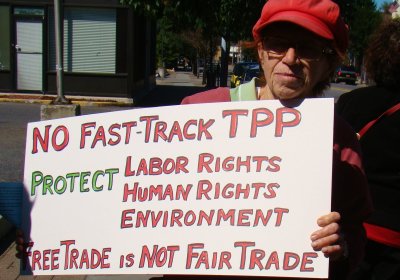Trans-Pacific Partnership (TPP)
The United States and 11 other Pacific Rim nations, including Australia, reached an agreement on October 5 on the Trans-Pacific Partnership, the largest regional trade accord in history.
There were huge protests against the Trans-Pacific Partnership held across New Zealand on August 15. About 10,000 protesters marched in Auckland, 5000 in Wellington, 4000 in Christchurch and thousands more in other parts of the country.
The Trans-Pacific Partnership (TPP) being negotiated between the US and 11 other Pacific Rim nations — including Australia — is a treaty covering regulations and investments.
United States politics is witnessing a new sorry spectacle — and one with real consequences for Australia, as well as other nations on the Pacific rim. US President Barack Obama is trying to drum up support from his party to implement the agenda of the huge corporations that sought to block his election and re-election via the proposed Trans-Pacific Partnership (TPP) “free trade” deal involving 12 Pacific rim nations.
- Previous page
- Page 2
- Next page










